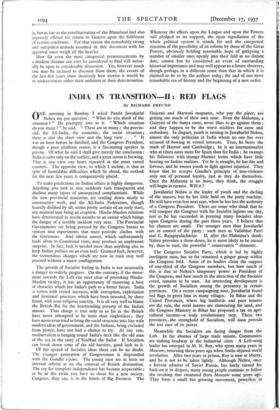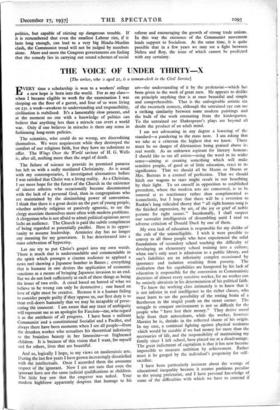INDIA IN TRANSITION -R : RED FLAGS
By RICHARD FREUND
ONE morning in Bombay I asked Pandit Jawaharlal Nehru my pet question : " What do you think of the situation ? " He promptly rose to it. " Which situation do you mean ? " he said. " There are so many ; the provin- cial, the All-India, the economic, the social situation ; there is also the short view and the long view . . " It was an hour before he finished, and the Congress President, though a poor platform orator, is a fascinating speaker in private. Of what he said I shall give merely the conclusion : India is calm only on the surface, and a great storm is brewing. That is one view one hears repeated in the most varied quarters. The opposite view, to which I incline, is that in spite of formidable difficulties which lie ahead, the outlook for the next few years is comparatively placid.
To make predictions on Indian affairs is highly dangerous. Anything you look at may suddenly turn transparent and disclose many layers of unsuspected complications. While the new provincial ministries are settling down nicely to constructive work, and the All-India Federation, though heartily disliked by all, seems pretty certain of an early start, any moment may bring an eruption. Hindu-Muslim relations have deteriorated in recent months to an extent which brings the danger of a terrible incident very near. The Provincial Governments are being pressed by the Congress bosses to venture into experiments that must provoke clashes with the Governors. And labour unrest, which unfortunately leads often to Communal riots, may produce an unpleasant surprise. In fact, luck is needed more than anything else to keep Indian politics on an even keel. Granted luck, however, the tremendous changes which are now in train may well proceed without a major conflagration.
The growth of Socialist feeling in India is not necessarily a danger to orderly progress. On the contrary, if the move- ment towards the Left can steer clear of provoking Hindu= Muslim rivalry, it has an opportunity of removing a host of obstacles which bar India's path to a better future. India is rotten with vested interests, with corruption, exploitation and irrational practices which have been invested, by sheer fraud, with semi-religious sanctity. It is all very well to blame the British Raj for the heartrending poverty of the Indian masses. That charge is true only in so far as the British have never attempted to be more than ringholders ; they have never even tried to bring the social structure into line with modern ideas of government, and the Indians, being excluded from power, have not had a chance to try. At any rate, mediaevalism is hanging round India's neck like the old man of the sea in the story of Sindbad the Sailor. If Socialism can break down some of the old barriers, good luc.k to it, Of the spread of Socialist ideas there can be no doubt. The younger generation of Congressmen is disgruntled with the Gandhi regime. The young men are as keen on internal reform as on the removal of British domination: The cry for complete independence has become respectable ; to be in the swim you have to shout for a new society. Congress, they say, is in the hands of Big Business. The Gujerati and Marwari magnates, who pay the piper, are getting too much of their own tune. Even the Mahatnia, a Gujerati of the banya caste, never likes to go- against them ; and they happen to be the worst sticklers for caste and orthodoxy. In disgust, youth is turning to Jawaharlal Nehru, almost the only politician in India whom no one has ever accused of bowing to vested interests. True, he bears the mark of Harrow and Cambridge ; he is an internationalist who at times cares more for. Spain than for India ; he swamps his followers with strange Marxist terms which have little bearing on Indian realities. Yet he is straight, he has fire and fervour, and he rouses youth to fight-against injustice. They know that he accepts Gandhi's principle of 'non-violence only out of personal loyalty, just as they. do themselies. Once the Mahatma is no more, they think, the struggle will begin in earnest. Will it ?
Jawaharlal Nehru is the leader of youth and the darling of the masses; but he has little hold on the party machine. He will have even less next year, when he has lost the authority of a Congress President. There are some who think that he will conquer the Congress with his Socialist legions one day, just as he has succeeded in pressing many Socialist ideas upon Congress during the past three years. I believe that his chances are small. Far stronger men than Jawaharlal are in control of the party : such. men as Vallabhai Patel and C. Rajagopalachariar. If, after the Mahatma's death, Nehru provokes a show-down, he is more likely to be ousted by, than to oust, the powerful " conservative " elements.
The Congress Socialist party, which is led by highly intelligent men, has so far remained a, ginger group within the Congress fold. Some of its leaders claim the support of one-third of the Congress members, but how much of this is due to Nehru's temporary power as. President of the Congress, and how much to the attraction of the Socialist creed, remains to be seen. An interesting development is the growth of Socialism among the peasantry in certain provinces. On a recent campaigning tour, Jawaharlal found- red flags to greet him in many villages. In Bihar and the United Provinces, where big landlords . and poor tenants are the rule, the rural masses are clamouring for land, and the Congress Ministry in Bihar has proposed a tax on agri- cultural income—a truly revolutionary step, These two provinces,. the stronghold of Socialism, will soon provide the test case of its power.
Meanwhile .the Socialists are facing danger' from the Left. In the absence of large trade unions, Communists are making headway in the industrial cities. A Left-wing leader has emerged in M. N. Roy, who spent many years •in Moscow, returning three years ago when Stalin abjured world revolution. After two 'years in prison, Roy is now at liberty, and he is not to be taken lightly. Although Nehru, once a terYent aamirei of Soviet Russia, has lately turned his back on it in disguit,manY yoUng people eontinne. to follow teaching that emanated fromMoscOW some years ago. They forma small but growing movement, :Powerless in
. _
politics, but capable of stirring up dangerous trouble. If it is remembered that even the smallest Labour riot, if it lasts long enough, can lead to a very big Hindu-Muslim dash, the Communist trend will not be judged by numbers alone. More and more the Congress governments are feeling that the remedy lies in carrying out sound schemes of social reform and encouraging the growth of strong trade unions. In this way the existence of the Communist movement lends support to Socialism. At the same time, it is quite possible that in a few years we may see a fight between Nehru and Roy, the issue of which cannot be predicted with any certainty.















































 Previous page
Previous page